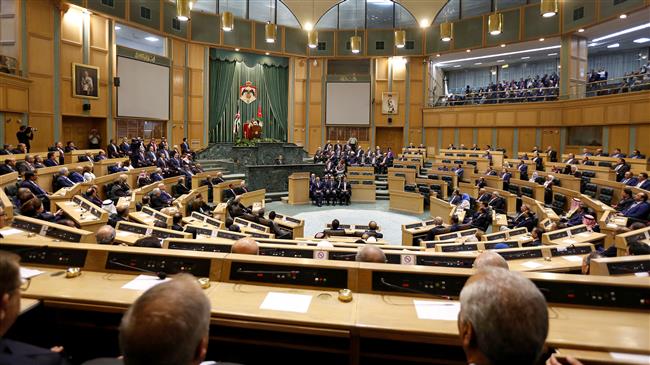Jordanian lawmakers vote to prohibit natural gas imports from ‘israel’
Jordan's parliament has voted in favor of a motion to ban natural gas imports from the Occupied Palestinian Territories in the wake of mass protests against the government’s multi-billion-dollar agreement with the Tel Aviv regime.

“The majority has voted to send the urgent motion to the government” requesting a law banning Israeli gas imports to Jordan, said Speaker of the House of Representatives Atef Tarawneh in remarks carried live by state television network on Sunday.
The text states that “the government, its ministries and state institutions and companies are prohibited from importing gas from Israel.”
Video footage showed a majority of legislators in the lower house stand up to back the motion.

Hundreds of Jordanians protest against gas deal with Israel, demand govt. resignationDemonstrators called on Prime Minister Omar Razzaz to step down.
The move came after 58 lawmakers out of the 130-strong legislature demanded such a ban in a letter to the parliament last month.
The motion will be passed to the government for approval, and must be sent back to the legislature for a formal vote at the upper house of the parliament.
Earlier this month, Jordan’s National Electric Power Co. said gas pumping from the Occupied Territories had started as part of a ten-billion-dollar deal.
The cash-strapped desert kingdom has defended the agreement, alleging it would cut $600 million a year from the state’s energy bill.

Jordanian protesters urge government to scrap gas deals with IsraelHundreds of Jordanians take to the streets of Amman to demand the government scrap its gas agreements with the Israeli regime.
On Friday, hundreds of Jordanians took to the streets of Amman in a demonstration organized by the Jordanian National Campaign Against the Gas Agreement with the Zionist Entity to express their resentment over the “shameful” deal with the Israeli regime.
They called on the government to scrap the gas import agreement, and demanded the ouster of Prime Minister Omar Razzaz.
Last week, hundreds of people protested in the northeastern Jordanian city of Zarqa against the import of natural gas from Israel.
The mayor of Zarqa, Imad al-Momani, called on the authorities to “cancel this humiliating agreement” while speaking to the demonstrators.
On September 26, 2016, Jordan’s National Electric Power Company signed a 10-billion-dollar deal with US-based Noble Energy and Israeli partners in order to tap the Leviathan natural gas field in the Mediterranean Sea off the coast of Israel for the supply of approximately 1.6 trillion cubic feet of natural gas, or 300 million cubic feet per day (mcf/d), over a 15-year term.
On March 26 last year, members of Jordan’s parliament called for the cancellation of the gas deal with Israel during a parliamentary session closed to the public.
Tarawneh stated at the time that all sectors of the society and members of parliament utterly reject Jordanian electricity company agreement to buy Israeli natural gas.

Hundreds of Jordanians protest against gas deal with IsraelThe protesters say Amman has made a deal to import “the gas of the enemy.”
Several legislators argued that the multi-billion-dollar deal violates Article 33, section two of the Jordanian constitution, which states, “Treaties and agreements which entail any expenditures to the Treasury of the State or affect the public or private rights of Jordanians shall not be valid unless approved by the parliament; and in no case shall the secret terms in a treaty or agreement be contrary to the overt terms.”
Lawmaker Saddah al-Habashneh said the deal was unconstitutional, stressing that members of parliament were not given access to read what he called the “secret” deal.
“Why are they hiding it? It’s a clue that there is something. It is totally rejected,” he commented.

1000s of Jordanians protest against gas deal with IsraelThousands of people have staged a demonstration in Jordan to protest against the kingdom
Habashneh then demanded the deal be scrapped along with Jordan’s peace accord with Israel – known as Wadi Araba Treaty and signed on October 26, 1994.
“We are calling for the Wadi Araba agreement to be dropped. What is peace when they’re attacking Gaza?” the parliamentarian said.
“And with yesterday’s recognition of the Golan Heights, what’s left? We want dignity,” he said.
On March 25, 2019, US President Donald Trump signed a proclamation, formally recognizing Israel’s ‘sovereignty’ over the Golan Heights. The announcement came as Israeli Prime Minister Benjamin Netanyahu visited the White House.
The Syrian Ministry of Foreign Affairs and Expatriates, in a statement, called the decision a “blatant attack on the sovereignty and territorial integrity” of Syria.
“The liberation of the Golan by all available means and its return to the Syrian motherland is an inalienable right,” according to the statement carried by Syria’s official news agency SANA, which added, “The decision … makes the United States the main enemy of the Arabs.”

Jordanians protest against natural gas deal with IsraelHundreds of Jordanians have taken part in a demonstration against a government agreement to import natural gas from the Israeli-occupied territories.
The Arab League also condemned the move, saying “Trump’s recognition does not change the area’s status.”
Iran, Iraq, Russia and Turkey also condemned Washington’s move.
Israel seized the Golan Heights from Syria after the 1967 Six-Day War and later occupied it in a move that has never been recognized by the international community. The regime has built dozens of settlements in the area ever since and has used the region to carry out a number of military operations against the Syrian government.







